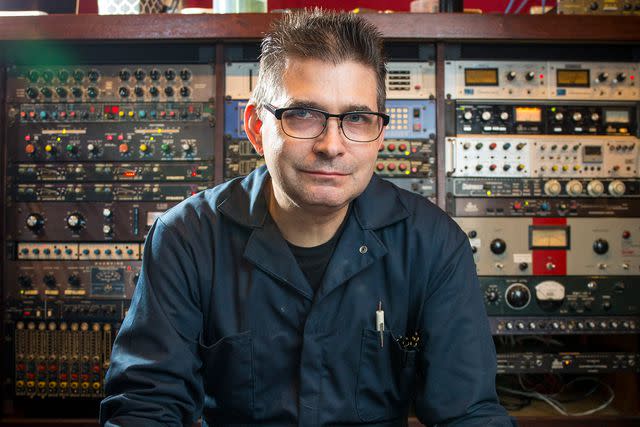Steve Albini, '90s producer for bands like Nirvana and Pixies, dies at 61
The prolific musician was a member of three punk bands and helped define alternative rock as an audio engineer.
Steve Albini, the iconoclastic rock musician and audio engineer who helped define the sound of iconic bands like Nirvana and Pixies in the 1990s, has died of a heart attack, staff at his Electrical Audio studio confirmed to Entertainment Weekly. He was 61.
Born on July 22, 1962, in Pasadena, Calif., Albini first started playing bass guitar while recovering from a broken leg as a teenager. While studying at Northwestern University's Medill School of Journalism, he became involved in the punk-rock scene in nearby Chicago and started his first group, Big Black, who were profiled in Our Band Could Be Your Life, journalist Michael Azerrad's seminal history of 1980s underground rock. Albini had two other bands, Rapeman and Shellac, the latter of which is set to release For All the Trains, their first album in a decade, later this month.

Brian Cassella/Chicago Tribune/Tribune News Service via Getty
Steve AlbiniIn addition to making his own music, Albini was revered as a recording engineer for other bands. He preferred the term "engineer" to "producer" because the latter is not necessarily associated with actual technical expertise. Albini founded his personal recording studio, Electrical Audio, in 1995.
His personal philosophy about engineering was not to impose his own aesthetic on bands but, rather, bring out their unique sound as much as possible.
Some of the most notable acts Albini worked with include Nirvana, Pixies, the Breeders, PJ Harvey, Godspeed You! Black Emperor, and Jimmy Page and Robert Plant of Led Zeppelin, among many others.
His work on Nirvana's third and final album, In Utero, helped distinguish it from their 1991 breakthrough LP, Nevermind, though Albini said in 2021 that it made him "persona non grata" with major record labels for years afterward.
Related: Revered indie producer and engineer Steve Albini slams 'club culture'
However, the backlash was mostly fine by him, as Albini was an outspoken critic of the corporate music industry. In his 1993 essay "The Problem With Music," he laid out the many obstacles facing young bands, from slimy agents to hack producers who repeat the same old pablum. Albini was never afraid to share his opinion on popular and underground culture; his commentary ranged from jokes to serious takes, like a 2021 Twitter thread in which he reckoned with his generation's use of "edgy" humor.
Sign up for Entertainment Weekly's free daily newsletter to get breaking TV news, exclusive first looks, recaps, reviews, interviews with your favorite stars, and more.
"He had a brilliant mind, was a great artist, and underwent the most remarkable and inspiring personal transformation," Azerrad wrote on Twitter following Albini's death.
"Steve touched countless lives and changed mine and many others for the better. A genuine, singular, principled person," wrote Dylan Baldi of Cloud Nothings, whose 2012 album, Attack on Memory, Albini engineered. "Spent the last 40 years helping people make art. There's no reason for him to be gone, and the world is less interesting without him. Just a really sad day."
I don't know what to say about Steve Albini's passing. He had a brilliant mind, was a great artist and underwent the most remarkable and inspiring personal transformation. I can't believe he's gone.
— Michael Azerrad (@michaelazerrad) May 8, 2024
steve touched countless lives and changed mine and many others for the better. a genuine, singular, principled person. spent the last 40 years helping people make art. there's no reason for him to be gone and the world is less interesting without him. just a really sad day.
— Cloud Nothings (@cloudnothings) May 8, 2024
Read the original article on Entertainment Weekly.
